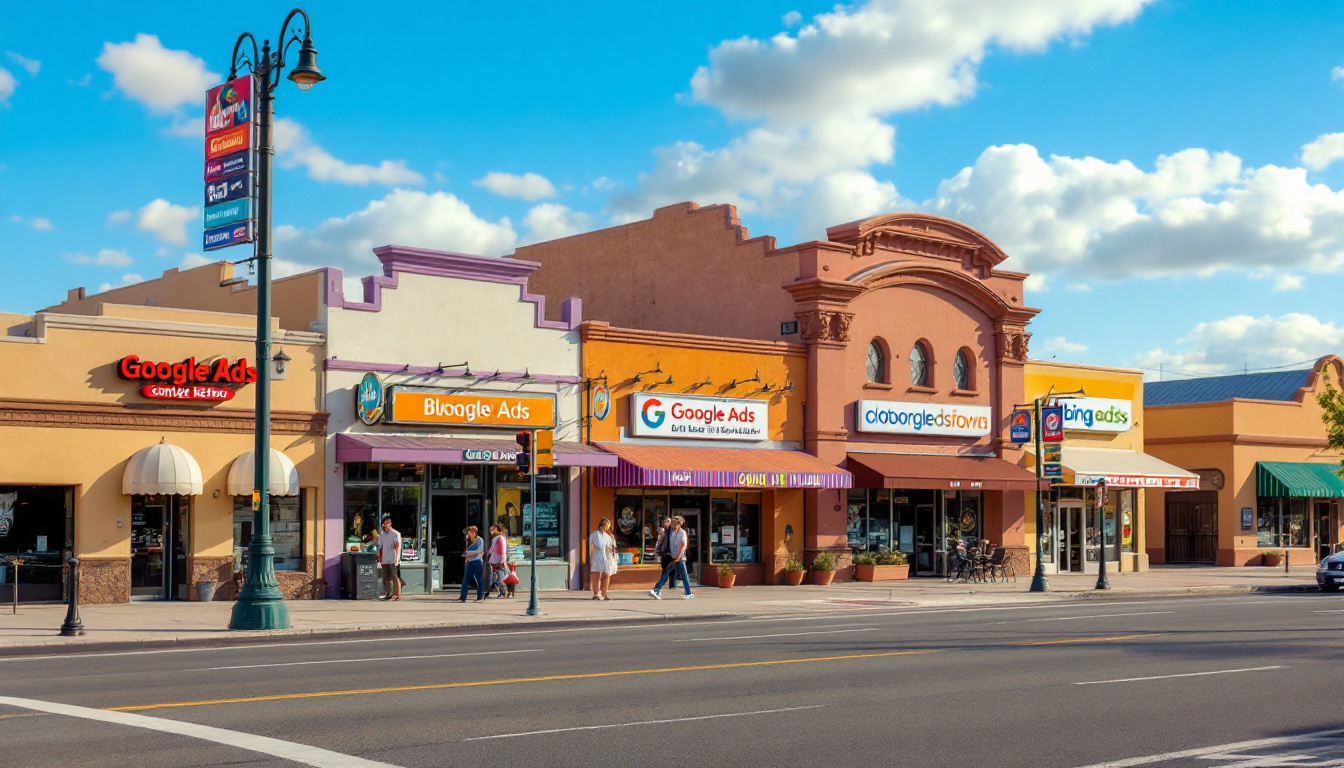10 Things Every Albuquerque, NM Business Should Know About PPC

Pay-per-click (PPC) advertising has become an integral part of digital marketing for businesses worldwide. In Albuquerque, NM, with its unique market landscape, understanding the nuances of PPC can offer businesses a competitive edge. Below are ten essential insights to help local businesses navigate the complexities of PPC advertising effectively.
Why PPC is essential for Albuquerque, NM businesses
PPC advertising is vital for Albuquerque businesses for several reasons. Firstly, it provides immediate visibility in search engine results, placing your business front and center for potential customers actively seeking your products or services. This immediate presence is particularly crucial in a fast-paced market where consumers often make quick decisions based on the first few results they see.

Secondly, with a city that boasts a diverse economy ranging from tourism to technology, businesses can target specific demographics effectively through PPC. By utilizing geographic targeting, businesses can ensure their ads reach the local population, enhancing engagement and conversion rates. For instance, a local restaurant can target ads to individuals searching for dining options in Albuquerque, thereby attracting both residents and tourists looking for authentic local cuisine.
Additionally, PPC allows for detailed performance tracking. Businesses can analyze which keywords and ads yield the best return on investment, enabling them to make data-driven decisions to optimize their marketing strategies. This level of analysis not only helps in refining current campaigns but also aids in forecasting future marketing trends based on consumer behavior.
Local advantages of PPC
One distinct advantage for Albuquerque businesses is the ability to focus on local customers. By using location-based keywords and ads, business owners can connect directly with their community, fostering loyalty and customer relationships. This localized approach can be particularly beneficial during events or festivals unique to Albuquerque, allowing businesses to capitalize on increased foot traffic and interest.
Moreover, Albuquerque has a vibrant small business landscape. When combined with PPC strategies, local businesses can level the playing field against larger competitors, ensuring their unique offerings are highlighted. For example, a small artisan shop can use PPC to showcase its handcrafted products to a targeted audience, drawing in customers who value local craftsmanship and supporting small enterprises.
Integration with other marketing efforts
PPC also works effectively alongside other advertising and marketing strategies, such as social media and email marketing campaigns. This integration creates a cohesive approach that can drive better results across all platforms. By synchronizing PPC efforts with social media ads, businesses can reinforce their messaging and increase brand recognition, making it more likely that potential customers will engage with their content.
Furthermore, utilizing retargeting strategies within PPC can significantly enhance conversion rates. When a user visits a website but does not make a purchase, retargeting ads can remind them of their interest, encouraging them to return and complete the transaction. This tactic is particularly effective in Albuquerque, where the local culture and community connections can be leveraged to create personalized and engaging ad experiences that resonate with potential customers.
Common misconceptions about PPC
Despite its effectiveness, several misconceptions surrounding PPC can deter businesses from leveraging it. One common belief is that PPC is only suitable for larger corporations with substantial marketing budgets. In reality, even with a small budget, local businesses can craft effective PPC campaigns to achieve their advertising goals. By focusing on specific keywords that resonate with their target audience, these businesses can create ads that drive traffic and conversions without breaking the bank. Additionally, platforms like Google Ads offer flexible budgeting options, allowing small businesses to set daily limits that align with their financial capabilities.
Another misconception is that once a PPC campaign is set up, it doesn’t require ongoing attention. This belief can lead to wasted advertising dollars. Regular monitoring and adjustment of campaigns based on performance are crucial for ensuring optimal results. For instance, analyzing click-through rates and conversion metrics can reveal which ads are performing well and which need tweaking. This iterative process not only enhances the effectiveness of the campaign but also helps in reallocating budget towards high-performing ads, maximizing return on investment.
The complexity of PPC management
Some businesses may also underestimate the strategic depth of PPC management. It involves keyword research, ad creation, and bid strategies that require expertise to implement effectively. Beyond just selecting keywords, understanding user intent and the competitive landscape is vital. Tools like Google Keyword Planner can assist in identifying high-value keywords, while A/B testing different ad copies can reveal what resonates best with the audience. Furthermore, the ability to segment campaigns based on demographics or geographic locations can significantly enhance targeting precision, leading to improved engagement and conversion rates.
Time commitment
Many believe that PPC campaigns are a set-and-forget solution. However, successful campaigns demand ongoing commitment and fine-tuning. Understanding this aspect is crucial for businesses considering PPC. Regularly reviewing analytics is essential to gauge the effectiveness of various elements, from ad copy to landing pages. Moreover, seasonal trends and market dynamics can influence campaign performance, necessitating timely adjustments. For example, a retail business might need to ramp up its PPC efforts during holiday seasons or sales events, requiring a proactive approach to stay competitive. This level of engagement not only ensures that campaigns remain relevant but also fosters a deeper understanding of customer behavior and preferences.
How to allocate your PPC budget effectively
Allocating your PPC budget wisely is vital to maximize your return on investment. Start by assessing your overall marketing goals. Are you looking to increase brand awareness, drive traffic, or generate leads? Your objectives will dictate how to prioritize your budget. Understanding the specific outcomes you want to achieve will help you tailor your campaigns more effectively, ensuring that every dollar spent contributes to your overarching strategy.

Next, analyze your competitors’ spending and performance. This comparison can provide valuable insights into industry benchmarks and where your business should position itself. Tools like SEMrush or SpyFu can offer a glimpse into your competitors' keyword strategies and ad placements, allowing you to identify gaps in the market that you can exploit. By understanding where your competitors are investing their resources, you can make informed decisions about where to allocate your own budget for maximum impact.
Setting a daily budget
Establish a daily budget that aligns with your overall financial goals. This budget will help you control spending while allowing flexibility in your campaigns. Consider allocating a portion towards testing new keywords or ad variations to continually refine your approach. Additionally, it’s wise to keep an eye on seasonal trends that may affect your industry; for instance, if you’re in retail, increasing your budget during the holiday season could lead to significant gains in visibility and sales.
Utilizing analytics for budget adjustment
Lastly, use analytics tools to track your PPC performance metrics. Regularly reviewing data allows you to adjust your budget based on which campaigns are generating the best returns. By reallocating funds towards high-performing campaigns, you optimize your advertising spend. Furthermore, consider setting up automated rules within your PPC platform to pause underperforming ads or increase bids on successful ones. This proactive approach ensures that your budget is always working hard for you, adapting to real-time performance and market fluctuations.
In addition to performance metrics, don’t overlook the importance of customer feedback and engagement data. Understanding how users interact with your ads can provide insights that go beyond mere clicks and conversions. For example, analyzing bounce rates and time spent on landing pages can reveal whether your ads are attracting the right audience. This information can guide your future budget allocations, ensuring that you invest in strategies that resonate with your target demographic and enhance your overall campaign effectiveness.
The role of keywords in PPC success
Keywords are the backbone of a successful PPC campaign. By selecting the right keywords, businesses can ensure their ads show up when potential customers search for related terms.
Conduct thorough keyword research to identify relevant and high-traffic keywords specific to your industry in Albuquerque. Long-tail keywords, which are more specific phrases, can be particularly effective, as they often have lower competition and higher conversion rates.
Negative keywords
Negative keywords play an essential role in refining your PPC strategy. By excluding irrelevant search terms, businesses can prevent their ads from appearing in unrelated queries, thereby saving budget and improving click-through rates.
Ad copy optimization
An effective ad copy should include relevant keywords while remaining compelling and clear. Highlight unique selling propositions that speak directly to your target audience in Albuquerque, which can help increase engagement with your ads.
How PPC fits into your overall marketing strategy
PPC is not a standalone marketing tool; it should complement your broader marketing strategy. Integrating PPC advertising with SEO, content marketing, and social media allows for a well-rounded approach that enhances brand visibility.
For instance, while SEO focuses on organic search positions, PPC can provide immediate traffic that supports your overall search engine marketing efforts. The synergy between these techniques can amplify results and drive sustained growth for your Albuquerque business.
Cross-channel promotion
Consider using PPC to promote specific campaigns or events that align with your ongoing marketing efforts. For example, if you are launching a new product, you can create dedicated PPC ads to draw attention while simultaneously promoting the launch through email or social media.
Tracking holistic performance
Lastly, ensure that you are tracking performance across all marketing channels to understand how PPC contributes to overall business goals. An integrated analysis provides insights that can drive more strategic decisions and investments.
In conclusion, PPC advertising is a powerful tool that can significantly benefit Albuquerque businesses. By following these insights and understanding how to navigate the PPC landscape, businesses can effectively enhance their presence and thrive in the local market.

As a Google Ads expert, I bring proven expertise in optimizing advertising campaigns to maximize ROI.
I specialize in sharing advanced strategies and targeted tips to refine Google Ads campaign management.
Committed to staying ahead of the latest trends and algorithms, I ensure that my clients receive cutting-edge solutions.
My passion for digital marketing and my ability to interpret data for strategic insights enable me to offer high-level consulting that aims to exceed expectations.


























